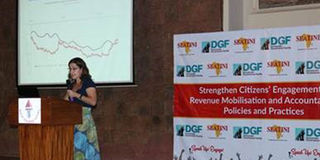Development partners avail Shs1.5b to promote tax compliance, accountability

Ms Clara Mira, IMF Resident Representative in Uganda making her presentations. She said government is losing taxes through granting tax exemptions and incentives yet it is the least of investors’ worries.
What you need to know:
- With the debt burden increasing every other financial year, the director of programmes at Uganda Debt Network, Mr Julius Kapwepwe said the project seems to offer long overdue solutions.
About Shs1.5 billion has been availed by development partners to promote tax compliance among the population as well as empower citizens to properly monitor and demand for revenue accountability particularly where they have been short-changed, Daily Monitor has established.
The Democratic Governance Facility (DGF) comprised of several development partners including: Austria, Denmark, Ireland, the Netherlands, Norway, Sweden, and the European Union will provide funding to the 18-months initiative dubbed: “Strengthening Citizens’ Engagement in Revenue Mobilization and Accountability Policies and Practices project.”
“As DGF funds this project, we hope that the citizens will be able to proactively pay their taxes and track (monitor) value-for-money in government expenditure; have in place a vibrant and coordinated national Tax Justice Alliance (TJA) where members actively engaged in revenue mobilization and accountability processes,” the Second Secretary, Royal Norwegian Embassy, Tina H. Oulie said on behalf of the developments partners.
Ms Oulie further noted during the launch of the project in Kampala that: “And that government will adopt and implement tax policies and practices that reflect inclusiveness, equity, transparency and accountability.”
To achieve the above, she said, the Southern and Eastern Africa Trade, Information and Negotiations Institute Uganda (SEATINI-Uganda) which have been selected as a DGF partner to implement the strengthening citizens’ engagement in revenue mobilization and accountability policies and Practices will work with other likeminded civil society organizations to jointly influence tax policy processes, enhancing collaboration and networking so as to generate alternative policy reforms especially on tax policies and practices.
Ms Oulie further said that this project is aimed at empowering the citizens to demand for accountability on the revenues mobilised by the state. The project, she added will contribute to building a confident citizenry that will ultimately and effectively engage with the state for its increased responsiveness to the needs of the people and for equitable and fair resource mobilization and utilization.
She was also of the view that project will have the positive effect of strengthening the social contract between the citizens and the state which she said is the foundation of democratic governance.
According to the development partners, empowered citizens play a necessary and natural watchdog role, holding those in authority to account for their performance, and demanding openness, accountability and integrity in the conduct of public affairs.

Ms Regina Navuga, the Programme Officer/ Financing for Development Programme at SEATINI-Uganda in her presentation enumerated the fact that donor community funding towards the national budget is dwindling, therefore local revenue mobilization must be hasten to cover the gaps.
“We strongly believe that open dialogue and constructive partnership between state and non-state actors is the best way to solve shared problems and attain higher standards of public resource management, transparency and improved service delivery. I therefore pray that your working relationship with SEATINI will be a very fruitful one,” she said.
As for SEATINI, the country director, Ms Jane Nalunga said under this project they will strengthened the understanding of population regarding their role as tax payers. This she said will be done through awareness creation on their tax obligations towards the state; and increased awareness of the impact of inequitable, non-inclusive and unresponsive tax policies and practices on revenue mobilization and accountability.
In her presentation, Ms Regina Navuga, the Programme Officer/ Financing for Development Programme at SEATINI-Uganda enumerated the fact that donor community funding towards the national budget is dwindling, meaning fair local revenue mobilization must be hasten to cover for the gaps created.
“We have a low tax base, corporate income tax accounts for 1.0 per cent of GDP, large Informal Sector costing the government an average of Shs1 trillion in PAYE revenue forgone, weak legal and policy frameworks that are skewed towards attracting Foreign Direct Investment,” She said
She continued: “This is in addition to costly Double Taxation Agreements and limited citizens’ engagement in the revenue mobilisation and demanding for accountability policies and practices at sub national and national level. This project in many ways comes in handy in boosting revenue compliance and empowering the population which is not known for firmly demanding for tax accountability although it is something within our rights.”
With the debt burden increasing every other financial year, the director of programmes at Uganda Debt Network, Mr Julius Kapwepwe said the project seems to offer long overdue solutions. He said: “ Against the fact of rising Uganda’s public debt from $5billion in FY2014/15 to excess of $15.2 billion at beginning of FY 2018/19, it’s prudent to look more inward to generation of own domestic resources and protecting what’s collected against the thieves, through such a project.”
Also only 5 countries in Africa registered a 7 percent economic growth rate target: Ethiopia, Senegal, Côte d’Ivoire, Ghana & Libya- despite the political conflict. So countries like Uganda must invest more into domestic revenue generation to meet their development financing needs and pull-up fiscal socks to possibly achieve about 5 per cent economic growth rate over the medium term.



